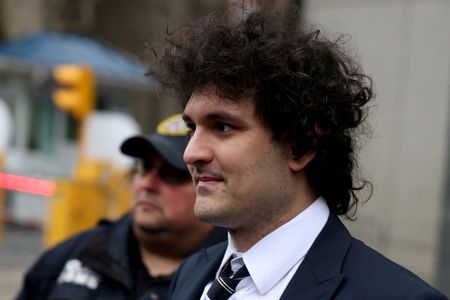By Luc Cohen
NEW YORK (Reuters) -U.S. prosecutors on Wednesday urged a judge to impose tight restrictions on indicted FTX cryptocurrency exchange founder Sam Bankman-Fried’s internet use, arguing existing conditions “leave too much room for inappropriate conduct.”
Separately, court documents earlier on Wednesday revealed that a former Stanford University law school dean and a computer science researcher at the school co-signed Bankman-Fried’s bond alongside his parents. He is out on $250 million bond after pleading not guilty to fraud charges stemming from now-bankrupt FTX’s collapse.
As conditions of his bail, U.S. District Judge Lewis Kaplan has barred the 30-year-old former billionaire from contacting current or former employees at his exchange and Alameda Research hedge fund, and from using encrypted messaging apps such as Signal that let users auto-delete messages.
That ban came after federal prosecutors in Manhattan raised concerns Bankman-Fried may be trying to influence potential witnesses ahead of his October trial on charges of diverting billions of dollars in FTX customer funds to his hedge fund, Alameda Research.
On Wednesday, prosecutors said Bankman-Fried’s use of a virtual private network (VPN) to access the internet after the ban was imposed raised further concerns. They urged Kaplan to bar him altogether from using the internet except to review evidence against him or use email on his Gmail account.
“The defendant is a technologically sophisticated person with both the ability and the inclination to seek workarounds of more narrowly drawn bail conditions,” prosecutors wrote.
He should be allowed to use voice calls and SMS messages on his cell phone, but should only be allowed to use Zoom to communicate with his lawyers, prosecutors wrote.
Bankman-Fried’s lawyers said his efforts to contact FTX’s current general counsel and chief executive were attempts to help, not to interfere. They said he used a VPN to watch National Football League playoff games because he had purchased an international subscription while living in the Bahamas.
They nonetheless proposed adding a bail condition that barred him from using a VPN unless one was needed to access prosecutors’ evidence so he could prepare his defense.
They proposed letting him communicate by phone, email, SMS text messaging and Twitter direct messaging, while disabling iMessage from his phone.
Kaplan is set to hold a hearing on Bankman-Fried’s bail conditions on Thursday.
BOND GUARANTORS
Earlier on Wednesday, Kaplan ordered the release of documents showing former Stanford Law School dean Larry Kramer signed a $500,000 bond to ensure Bankman-Fried’s return to court, and Stanford computer science researcher Andreas Paepcke signed a $200,000 bond.
Bankman-Fried’s parents Joseph Bankman and Barbara Fried, who are both Stanford law professors, had pledged their Palo Alto, California home as collateral as part of the $250 million bail package ensuring their son’s return to court.
The names of the two other sureties were redacted, but Kaplan later ruled in favor of media outlets including Reuters that argued the public had a right to know their identities. Bankman-Fried argued the guarantors safety was at risk, but decided not to pursue an appeal of Kaplan’s ruling, according to a person familiar with the matter.
In a statement, Kramer said he and his wife have been friends with Bankman and Fried for decades. He said they had been supportive in the past two years “while my family faced a harrowing battle with cancer.”
“In turn we have sought to support them as they face their own crisis,” Kramer wrote. “My actions are in my personal capacity, and I have no business dealings or interest in this matter other than to help our loyal and steadfast friends.”
Paepcke did not respond to a request for comment.
(Reporting by Luc Cohen in New York; Editing by Daniel Wallis and Lincoln Feast)

